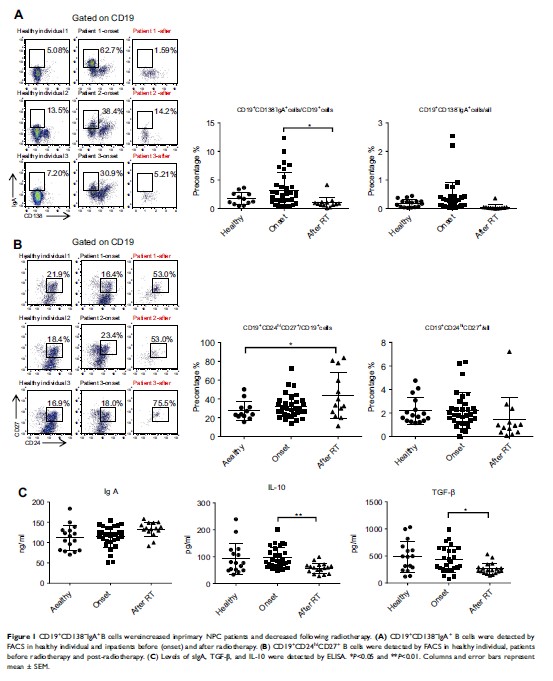9 0 9 6 8
论文已发表
注册即可获取德孚的最新动态
IF 收录期刊
- 2.6 Breast Cancer (Dove Med Press)
- 3.9 Clin Epidemiol
- 3.3 Cancer Manag Res
- 3.9 Infect Drug Resist
- 3.6 Clin Interv Aging
- 4.8 Drug Des Dev Ther
- 2.8 Int J Chronic Obstr
- 8.0 Int J Nanomed
- 2.3 Int J Women's Health
- 3.2 Neuropsych Dis Treat
- 4.0 OncoTargets Ther
- 2.2 Patient Prefer Adher
- 2.8 Ther Clin Risk Manag
- 2.7 J Pain Res
- 3.3 Diabet Metab Synd Ob
- 4.3 Psychol Res Behav Ma
- 3.4 Nat Sci Sleep
- 1.9 Pharmgenomics Pers Med
- 3.5 Risk Manag Healthc Policy
- 4.5 J Inflamm Res
- 2.3 Int J Gen Med
- 4.1 J Hepatocell Carcinoma
- 3.2 J Asthma Allergy
- 2.3 Clin Cosmet Investig Dermatol
- 3.3 J Multidiscip Healthc

放射治疗诱导活性氧簇专门用于消除鼻咽癌中的 CD19+IgA+B 细胞
Authors Li W, Wang L, Shen C, Xu T, Chu Y, Hu C
Received 21 January 2019
Accepted for publication 6 June 2019
Published 8 July 2019 Volume 2019:11 Pages 6299—6309
DOI https://doi.org/10.2147/CMAR.S202375
Checked for plagiarism Yes
Review by Single-blind
Peer reviewers approved by Dr Cristina Weinberg
Peer reviewer comments 2
Editor who approved publication: Dr Ahmet Emre Eskazan
Purpose: Nasopharyngeal carcinoma (NPC) is one of the most common head and neck cancers and is thought to be related to the mucosal immune system. Radiation therapy (RT) is the primary treatment for NPC due to the high radiosensitivity of cancer cells. However, little is known about the impact of RT on the mucosal immune system.
Patients and methods: In this study, the expression of immune markers CD19, CD24, CD27, CD8, and IgA before and after RT, were analyzed using flow cytometry. Cytokines were assessed using the enzyme-linked immunosorbent assay. Reactive oxygen species (ROS) was assayed by flow cytometry and fluorescence staining using 2ʹ,7ʹ -dichlorofluorescein diacetate.
Results: We found that primary NPC patients had a significant increase in CD19+CD138−IgA+ B cells, which was then decreased after RT. Interestingly, the changes in CD19+CD138−IgA+ B cell frequency was accompanied by corresponding frequency changes in cytotoxic T cells (CTL), which are powerful anti-tumor lymphocytes. Mechanistically, we found that ROS release during RT specifically eliminated CD19+CD138−IgA+ B cells.
Conclusion: These findings suggest that RT may regulate the immune system and opens up new avenues for the utilization of immune-radiotherapy in NPC.
Keywords: B cells, IgA, nasopharyngeal carcinoma, radiation therapy, regulatory immune cells
